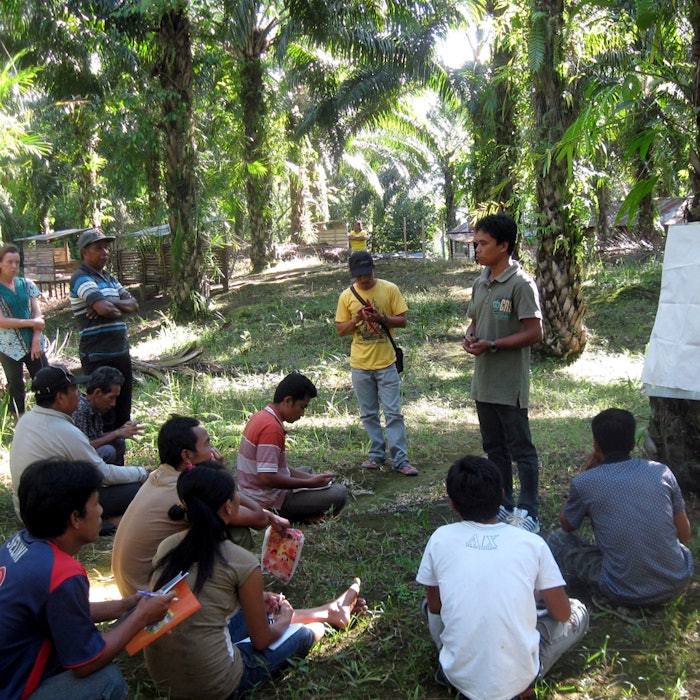
Small farms produce around 40% of the world’s palm and palm kernel oil and therefore, countries in production need to increase the yields from the land, which are already under cultivation.
Henkel and BASF are collaborating with development organization Solidaridad to support a project in Indonesia and advocate for smallholders and local initiatives. Henkel has supported the five-year project since 2015 in the Indonesian province of West Kalimantan. BASF joined earlier this year as an additional partner.
Training Farmers and Fulfilling Requirements
Solidaridad implements the smallholder program in cooperation with partners Good Return and Credit Union Keling Kumang (CUKK). Good Return is an Australian non-governmental organization that coaches and supports teachers and trains farmers during the project and even after it is completed. CUKK is the second largest local credit organization in Indonesia, and the teachers supported by Good Return are employed by CUKK.
The training programs follow a number of requirements to teach the smallholders sustainable farming methods, efficient production and high occupational health and safety standards. Additionally, the project aims to establish sustainable supply chains for palm and palm kernel oil to improve smallholders’ living conditions. This also qualifies the project for certification according to the criteria of the Roundtable on Sustainable Palm Oil.
With roughly 5,500 farmers trained as part of the project, 1,600 will learn about the various aspects of good agricultural practice described, in addition to measures for increasing crop yields. With the project spanning an area of about 16,000 hectares, an additional roughly 3,900 smallholders will be reached through both a multiplier effect, and through farmer field days, along with regular text messages on their mobile phones.
Project Support
“We want to change the market to develop a sustainable palm oil industry. To do so, we also need solutions and projects that allow small farms to increase productivity on their plantations—and we are making an important contribution to that by supporting local partners and initiatives,” explained Thomas Müller-Kirschbaum, corporate senior vice president in the Laundry & Home Care business unit and deputy chairman of Henkel’s Sustainability Council.
“With BASF supporting this smallholder project as an additional industrial partner, we’re sending the signal that we are joining forces to make the palm oil market more sustainable.”
“BASF is one of the largest global manufacturers of ingredients for the cosmetics industry as well as the home care industry, and one of the links in the palm oil supply chain from smallholders to end consumers. We believe that we can only find solutions for sustainable, certified palm oil products by working together to preserve the forests and improve the living conditions of the people in the farming areas,” said Jan-Peter Sander, senior vice president at BASF Personal Care Europe.
“That’s why we are collaborating intensively with our customers and suppliers, and also want to involve more smallholders in the dialog. The project in West Kalimantan is an important step in this direction.”
Increasing Yields and Smallholders’ Benefits
In comparison to larger companies, the productivity of small farms in the palm oil industry is estimated to be 40% lower than average. However, palm fruit yields and smallholders’ revenue are expected to increase with this farmer training and sustainable farming methods.
“We are delighted that Henkel and BASF are supporting this project in West Kalimantan,” said Marieke Leegwater, program manager palm oil at Solidaridad. “We think that it is of great interest that companies using palm oil products take responsibility beyond just buying sustainable palm oil and contribute to investing in more sustainable and inclusive palm oil supply chains on the ground.
"This project certainly contributes to building such inclusive and sustainable chains, as it is expected to make a significant contribution to improve the livelihoods of independent oil palm farmers in the province of West Kalimantan, one of the poorest regions in Indonesia.”










